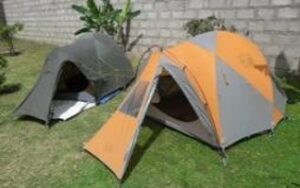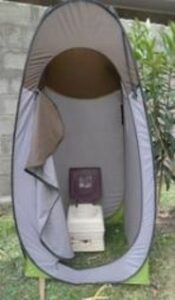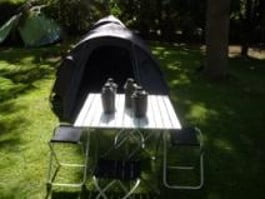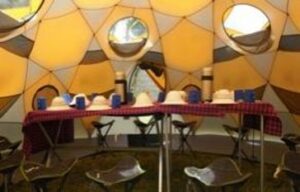INFO COVID 19 : la Tanzanie est ouverte aux touristes sous réserve d'un schéma vaccinal COMPLET à partir de 5 ans ou d'un test PCR négatif de moins de 72h.
INFO COVID 19 : la Tanzanie est ouverte aux touristes sous réserve d'un schéma vaccinal COMPLET à partir de 5 ans ou d'un test PCR négatif de moins de 72h.
From
$ 2980
/ PEOPLE
Private ascent of the Machame route - 09 days / 08 nights
STAGES OF YOUR TRIP
CONTACT AN ADVISOR
Welcome on arrival at Kilimanjaro airport and transfer to the lodge located close to the airport.
Free dinner and overnight stay at the lodge
Depart Arusha in the morning for the Chagga village of Machame, the starting point of this trek, a 4-6 hour walk through a dense, inextricable forest of rubber, giant ferns, begonias and ficus.
Gradually gaining altitude, the vegetation changes. The tropical forest gives way to tall grasses and giant heather.
We set up camp near the Machame Hut huts (3050m).
Walking time: 4 to 6 hours
Leaving the camp, with, if the weather is clear, a marvellous view of Uhuru, the path winds through a savannah of tall grasses, volcanic rocks and lichen-bearded heather….
Then the first giant ragwort trees appear, like sentinels guarding an untouched territory. The steeper path crosses a ghostly landscape of volcanic lava, caves and streams, all the way to the plateau.
After a 5-6 hour walk you will reach Shira camp (3700m).
Walking time: 5 to 6 hours
Breakfast.
Leaving the Shira bivouac, the route heads towards Kibo. The climb is steady until you reach the Lawa Tower pass at 4570m.
The descent to Barranco Camp leads to the edge of a gigantic canyon. The great Barranco, in which ragwort grows in abundance, watered by countless small waterfalls.
After a 6-hour walk and a pass at 4600m, we set up camp at Barranco Hut (3950m).
Walking time: 6 hours.
Breakfast.
You will cross the great wall of the Barranco. It’s not difficult, but the cliff face is impressive.
After a long crossing, all uphill and downhill on the slopes of the Kilimanjaro you arrive at your camp for the night.
Walking time: 3 hours.
We’re continuing with our logic of short stages to help you acclimatise perfectly.
You climb up a large moraine to the Barafu camp (4550m).
Walking time: 3 hours.
Departing around midnight, it can be between -10°C and -15°C.
The path winds up to the foot of the Ratzel and Rebman glaciers, between which the track runs. The slope is steep, the atmosphere unreal amidst these hanging glaciers.
After a 6-hour walk, at first light, you’ll reach the rim of the crater, between Stella and Hans Meyer points.
Another hour of effort on the snow-covered crest of the volcano to reach the summit, Uhuru Peak (5895m).
Here, you can build up your strength before starting the descent to Mweka Hut, reached in the afternoon after a 3-4 hour walk.
Walking time: 9 to 10 hours.
Direct descent to the park gates. Allow 6-7 hours to reach Mweka Gate.
Before lunch, you will say goodbye to the porters and cooks. Your guides will take the opportunity to present you with your diplomas if you have reached the summit.
Transfer to Arusha.
After breakfast at the lodge, you will spend a free morning to organise on site.
Lunch not included.
After lunch, departure for Kilimanjaro airport for your international flight or start of your safari or flight for a relaxing extension to Zanzibar!
WE DO NOT ORGANISE DEPARTURES IN MARCH / APRIL / MAY AND NOVEMBER (LOW SEASON)
| NUMBER OF PEOPLE | RATES PER PERSON IN USD |
| 2 participants | 1950 / person + $1030 / person park tax |
| 3 participants | 1540 / person + $1030 / person park tax |
| 4 participants | 1390 / person + $1030 / person park tax |
| 5 participants | 1270 / person + $1030 / person park tax |
| 6 participants | 1210 / person + $1030 / person park tax |
| 7 participants | 1160 / person + $1030 / person park tax |
| 8 participants | 1130 / person + $1030 / person park tax |
| 9 participants | 1050 / person + $1030 / person park tax |
| 10 participants | 1070 / person + $1030 / person park tax |
Single room supplement: $ 90




Climbing Kilimanjaro is a real sporting challenge, not just a simple mountain walk.
Temperatures at the summit can be extreme, particularly at night when it can be between -5°C and -20°C. During the first few days, temperatures are temperate, sometimes hot, and there may be some bad weather. The lack of oxygen due to the effects of altitude requires the body to acclimatise by increasing the level of red blood cells in the blood. Good hydration (3 to 5 litres of water a day) is absolutely essential.
You will therefore need to bring : All your belongings are divided between a rucksack worn during the walk and a 55-litre soft canvas carry bag, given to everyone at the briefing. (Entrusted to the porters).
The bag entrusted to the porters must not exceed 12 kilos per person + a travel bag which will remain at the lodge during the ascent.
For water:
Please note that from the 2nd day onwards, you will be drinking spring water; we strongly advise you to use purification tablets.
*Plastic bottles of mineral water are banned in Kilimanjaro National Park to reduce the amount of waste.
+ A FIRST-AID KIT
– Everything you need for this type of climb (ask your doctor for advice) Painkillers, eye drops, vitamin C, compeed for blisters, mosquito repellent, paracetamol, anti-diarrhoea medication, antibiotics and disinfectant with a compress.
Passport valid for 6 months after the date of return.
For French nationals, a visa is compulsory. It can be obtained on arrival at the airport. You will be asked to pay $50 in cash (USD banknotes dated after 2006). Waiting times at the airport for visas can be long; expect to wait between 2 hours and 2.5 hours. Visas can also be obtained online, but please allow 2 to 3 weeks for processing. The Tanzanian authorities’ official online visa application website: https://eservices.immigration.go.tz/visa
+1h in summer, +2h in winter compared with France.
The yellow fever vaccine was reinstated in early 2008. You should allow more than 14 days before your departure. Don’t forget to take your international vaccination certificate with you, as customs officials may ask for it when you enter Tanzania or Zanzibar.
Vaccinations not compulsory but recommended: against typhoid, hepatitis A, hepatitis B, DTP and in certain cases against meningitis A and C, and against rabies (check with your doctor).
Preventive treatment against malaria is essential. Remember to take mosquito repellent with you.
English and Swahili are the two official languages. There are also many African dialects, reflecting the country’s tribal diversity.
Tanzanian shilling: 1€=2600 TSH (January 2019)
For US dollars, remember to take notes issued after 2006 !!!
Since the recent ban on bureaux de change in Tanzania, you can only withdraw Tanzanian shillings from ATMs in Arusha, Dar es Salaam and Zanzibar. However, the euro and, more particularly, the US dollar are widely used and may suffice to pay for all your purchases in Tanzania (USD notes dating from after 2006). But be sure to carry small denominations;
If you wish to pay for certain purchases by credit card, you should be aware that additional credit card payment charges will be applied (approximately 4 to 6%).
The current is 230V. The plug is English; an adaptor is recommended.
Apart from the Kilimanjaro ascent, which requires special equipment, the weather is relatively warm all year round. You should, however, bring a jumper and windbreaker for nights spent near the crater or in a bivouac, as well as for stays in July and August, which can be cooler months. It is advisable to wear light trousers in the parks to ensure peaceful cohabitation with certain insects.
You’ll also need light walking shoes, a hat, sun cream, a torch, binoculars and batteries for your camera. Cameras with zoom lenses can be hired.
Please note that for domestic flights, only soft baggage, strictly limited to 15kg, is allowed (including hand baggage)!
It is common practice to tip people who accompany or assist you on your journey. To take your bag to your room, the porter will expect a small tip of TSH 500 (around €30), and the driver guide will expect $20 per day on safari.
Tanzanian Consulate and Embassy in the United Kingdom:
Tanzania High Commission,
3 Stratford Place W1C 1AS, London,
UNITED KINGDOM
Tel: +44 207 569 1470 / +44 207 491 3710
Email: london@nje.go.tz
https://www.uk.tzembassy.go.tz/
Embassy of the United Kingdom in Tanzania in Dar es Salaam :
British High Commission in Dar es Salaam
Tanzania Umoja House Garden Avenue
PO Box 9200 Dar es Salaam Tanzania
Phone : (+255) (22) 229 0000
Free days in Zanzibar
Village visit
Following the Great Migration
Meeting local people
Visit to Arusha National Park
Crossing the Ngare Nanyuki River between buffalo and giraffe
Free days in Zanzibar
Village visit
Following the Great Migration
Meeting local people
Visit to Arusha National Park
Crossing the Ngare Nanyuki River between buffalo and giraffe
![]() Le voyage organisé par Hors Piste et par Soline en particulier a été parfaitement orchestré. Nous avions discuté avec Soline de nos envies et besoins et elle a été... read more à l’écoute et nous a parfaitement conseillé.
Le voyage organisé par Hors Piste et par Soline en particulier a été parfaitement orchestré. Nous avions discuté avec Soline de nos envies et besoins et elle a été... read more à l’écoute et nous a parfaitement conseillé.
Nous partions avec nos enfants et petits enfants et les timing à été parfait , les découvertes extraordinaires. Nos guides ont été très chouettes , chaque étape à été agréable. Les hôtels bien choisis.
Bref c’était parfait. Merci à eux. Merci à Soline qui a été à l’écoute et toujours présente.
![]() Il est toujours difficile de donner en quelques lignes un avis ou des impressions qui arrivent à restituer les émotions érpouvées lors d'un tel voyage, probablement aussi difficile que de... read more s'imaginer avant le départ à quoi s'attendre exactement.
Il est toujours difficile de donner en quelques lignes un avis ou des impressions qui arrivent à restituer les émotions érpouvées lors d'un tel voyage, probablement aussi difficile que de... read more s'imaginer avant le départ à quoi s'attendre exactement.
On part toujours avec une idée en tête, un programme bien sur et évidemment plusieurs milliers d'euros dépensés dans l'espoir d'un voyage hors du commun. On craint bien sur d'être un peu déçu compte tenu de l'investissement. Le jeu en vaut-il la chandelle ? Est ce que voir des animaux en vrai c'est si éblouissant par rapport à ce qu'on peut en voir dans les documentaires voire dans le zoos ? On ne s'inquiétait pas tellement du reste ( hébergements , nourriture et autres ) mais bien sur ça aurait pu là aussi être décevant. Vu le nombre d'agences, on se demande toujours si on a fait le bon choix.
Puis le jour J, on fait un voyage en avion , bardé de ses papiers et affaires à trainer et la tête encore pleine de son chez soi voire de ses ennuis de travail. On débarque un peu fatigué au Kilimandjaro Airport pour se faire voiturer gentiment jusqu'au premier lodge. Déjà la couleur de la terre, l'ambiance, les odeurs s'imposent et on prend sa première claque dès qu'on est sorti des quelques kilomètres bitumés qui déservent l'aéroport . Première piste, premières cahutes en terre et les enfants qui guident des troupeaux de vaches à bosses. L'Afrique.
A partir de là ça va crescendo . On traverse ville et village dans un 4x4 confortable, vitres ouvertes pour se remplir les yeux des images des endroits traversés. Les paysages secs découpés par des ergs à sec, déjà quelques acacias. puis le premier parc ( le Manyara) On s'attarde des heures le premier malheureux zèbre sans savoir qu'on va naviguer quelques jours plus tard au milieu de milliers de ses congénères dans de vastes étendues sauvages peuplées de troupeaux de buffles, zèbres , antilopes eux même surveillés de près par leurs prédateurs au repos ou à l'affût. La première journée se termine à peine qu'une troupe complète d'éléphants passe autour de nous, à portée de main , de nez , d'oreille et on a oublié documentaires et divers parcs animaliers.
On ne le sait pas encore mais on a peine commencé le voyage. Il va encore durer quelques jours dans ces paysages intouchés depuis des millions d'années, à sillonner les pistes, à guetter les animaux dont certains parmi les plus rares du monde et à les approcher souvent à quelques mètre si ce n'est quelques centimètre parfois. Magique vraiment.
On a eu la chance d'avoir un guide idéal comme le nôtre (Peter/Kimé) vrai passionné amoureux de la nature qui peut parfois s'arrêter et nous montrer un animal qu'on aurait jugé insignifiant mais qui se révèle être rare et/ou difficile à voir et qui nous a proposé des horaires et des itinéraires avec plus d'intimité avec la nature. Il a même pris le temps de nous faire découvrir quelques quartiers d'habitation d'Arusha parce qu'essayer de voir un tant soit peu la vie locale réelle nous tenait à coeur. N'hésitez pas à le demander pour votre projet, vous ne serez pas déçu.
D'un point de vue pratique , les hébergements et divers repas étaient absolument sans reproche. On a bénéficié d'un luxe inouï surtout compte tenu de l'environnement sauvage de la majorité du séjour. Mention spéciale au magnifique lodge Ndutu Safari Lodge ( Magnifique endroit en pleine nature avec la faune sauvage à quelques mètres ) au ngorongoro forest tented lodge ( superbe avec une équipe d'une extrême gentillesse) et au Wildlands mobile camp du Serengeti ( Equipe très très sympathique et les buffles qui dinent quasiment en notre compagnie le soir) mais tous les hébergements sont absolument somptueux.
On fait un classique passage reposant ( ce qui n'est pas du luxe, la partie safari avec les pistes et les longues journées d'observation garantit d'excellentes nuits de sommeil) par Zanzibar après la partie Safari. On était hébergé à la Villa Kivu sur la côte Est. Hébergement et repas absolument parfaits là encore. C'est un peu loin de Stone Town mais on a tout de même pu faire une visite qui s'organise très facilement sur place .
D'un point de vue général, l'organisation Hors Piste/Wildlands a été sans reproche. Depuis la conception du voyage par Elisabeth jusqu'au dernier taxi pour nous déposer à l'aéroport international de Zanzibar et notre avion de retour. Grand merci à eux !

CONTACTER UN CONSEILLER
Bonjour, je suis Gary d'Hors Pistes Voyages ! Je suis là pour répondre à vos questions :)